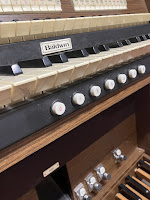5 Quick Tips (5QT) to Make You a Better Accompanist Today
When I first started writing this blog, I had a plan of sorts, which included periodic "5 Quick Tips" to improve your performance at every different job in liturgical music. This is not an earth-shaking list, it's literally just bite-sized habits you can incorporate to make things a little easier on yourself. Try working on one new little habit per month.
Let's begin with the Organist:
1. Hit the "Cancel" button after every hymn. No mistake feels more conspicuous than stepping on a pedal by mistake when there are stops open. Those keys are sensitive, man. Make it a habit to turn everything off between pieces. (My five-year-old likes to sit on the bench next to me, and pressing the cancel button is his job.)2. Choose your tempo before beginning the intro. Changes in tempo make the congregation uncertain. An uncertain congregation is a silent congregation. Count yourself in, start playing at the tempo you intend to use throughout, and stick with it. Don't slow down between verses either - ritardando is the universal cue for "this is the last verse we are singing."
3. Breathe when the singers breathe. If you can't squeeze in a breath between phrases, you're going too fast. Even if you aren't singing along sotto voce, you should time your breathing with the singers just so you are aware of the pacing they need in order to follow you.
4. Familiarize yourself with the changing tone of the words ahead of time. This will allow you to make appropriate registration changes between verses. If the hymn seems to be growing more contemplative, start bringing it gradually down. If there's a killer Doxology at the end, get ready to kick in some extra pedal stops. Practice the whole hymn, at least thinking the words along with the accompaniment, and consider the registration of each verse separately.
5. Save the pedal to cue the congregation. If accompanying a psalmist, say, don't use the pedal on the psalm verses. Bring it back in on the refrain, and the congregation will hear it as a cue for them to sing. This also saves your cantor's voice a little, by naturally scaling back the volume.

Comments
Post a Comment